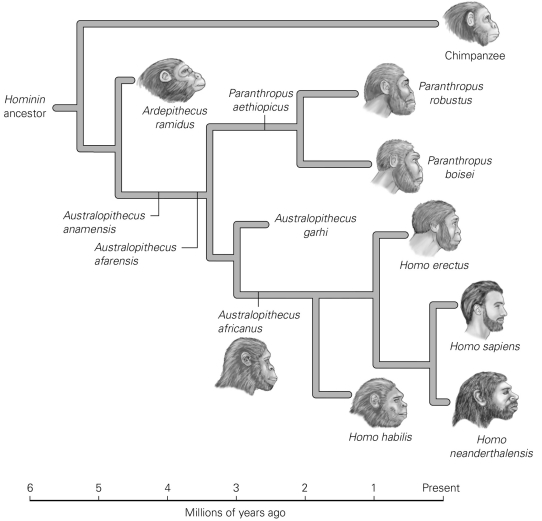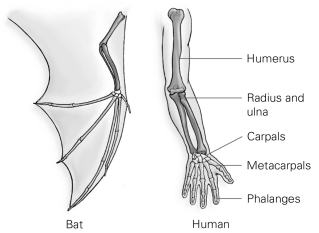Exam 10: Where Did We Come From the Evidence for Evolution
Exam 1: Can Science Cure the Common Cold Introduction to the Scientific Method79 Questions
Exam 2: Science Fiction, Bad Science, and Pseudoscience:53 Questions
Exam 3: Is It Possible to Supplement Your Way to Better Performance and Health87 Questions
Exam 4: Body Weight and Health: Enzymes, Metabolism, and Cellular Respiration63 Questions
Exam 5: Life in the Greenhouse: Photosynthesis and Climate Change70 Questions
Exam 6: Cancer: DNA Synthesis, Mitosis, and Meiosis58 Questions
Exam 7: Are You Only As Smart As Your Genes Mendelian and Quantitative Genetics71 Questions
Exam 8: DNA Detective: Complex Patterns of Inheritance and Dna Profiling65 Questions
Exam 9: Genetically Modified Organisms: Gene Expression, Mutation,66 Questions
Exam 10: Where Did We Come From the Evidence for Evolution72 Questions
Exam 11: An Evolving Enemy: Natural Selection70 Questions
Exam 12: Who Am I Species and Races70 Questions
Exam 13: The Greatest Species on Earth Biodiversity and Classification61 Questions
Exam 14: Is the Human Population Too Large Population Ecology69 Questions
Exam 15: Conserving Biodiversity: Community and Ecosystem Ecology72 Questions
Exam 16: Where Do You Live Climate and Biomes72 Questions
Exam 17: Organ Donation: Tissues and Organs54 Questions
Exam 18: Binge Drinking: the Digestive and Urinary Systems28 Questions
Exam 19: Clearing the Air: Respiratory and Cardiovascular Systems54 Questions
Exam 20: Vaccination: Protection and Prevention or Peril Immune System,68 Questions
Exam 21: Human Sex Differences: Endocrine, Skeletal, and Muscular Systems57 Questions
Exam 22: Is There Something in the Water Reproductive and Developmental Biology67 Questions
Exam 23: Study Drugs: Brain Boost or Brain Drain Brain Structure and Function68 Questions
Exam 24: Feeding the World: Plant Structure and Growth71 Questions
Exam 25: Growing a Green Thumb: Plant Physiology66 Questions
Select questions type
Which fact best supports the hypothesis of one common ancestor for all life?
(Multiple Choice)
4.8/5  (35)
(35)
Which statement best describes the now-discredited theories of Lamarck?
(Multiple Choice)
4.8/5  (37)
(37)
True or false: Evolution is a very controversial idea among scientists.
(True/False)
4.9/5  (43)
(43)
When a biologist is looking for a suitable organism in which she can study the process of evolution in a laboratory setting, what would be an important consideration?
(Multiple Choice)
4.8/5  (44)
(44)
Which species is most likely to share the greatest percentage of DNA with humans?
(Multiple Choice)
4.9/5  (45)
(45)
What order of events would show how natural selection occurred in a population of lice that could originally be controlled by the chemical permethrin?
(Multiple Choice)
5.0/5  (31)
(31)
Which statement is true about predictions made from the theory of common descent?
(Multiple Choice)
4.9/5  (41)
(41)
What does the presence of a tail in early human embryos and other chordates suggest about all chordates?
(Multiple Choice)
4.8/5  (37)
(37)
Why is the separate types hypothesis considered so unlikely by most biologists?
(Multiple Choice)
4.7/5  (31)
(31)
Which example shows nonevolutionary change in a population?
(Multiple Choice)
4.9/5  (36)
(36)
 -You're examining fossils from a variety of hominin species. Which fossils would show the greatest amount of radioactive material in relation to daughter products?
-You're examining fossils from a variety of hominin species. Which fossils would show the greatest amount of radioactive material in relation to daughter products?
(Multiple Choice)
4.9/5  (41)
(41)
What is the role of fossils in supporting the theory of common descent?
(Multiple Choice)
4.8/5  (43)
(43)
Which scientist also proposed a mechanism for evolution similar to natural selection?
(Multiple Choice)
4.9/5  (39)
(39)
 -From the perspective of an evolutionary biologist, what significant information can be inferred from this figure?
-From the perspective of an evolutionary biologist, what significant information can be inferred from this figure?
(Multiple Choice)
4.9/5  (30)
(30)
Which description would be considered a scientific theory like the theory of evolution?
(Multiple Choice)
4.8/5  (31)
(31)
Of the four hypotheses that explain the origin of modern organisms, which hypothesis has the least scientific support?
(Multiple Choice)
4.9/5  (45)
(45)
True or false: Almost as much evidence exists to support the hypothesis of transformation as the theory of common descent.
(True/False)
4.8/5  (39)
(39)
Showing 21 - 40 of 72
Filters
- Essay(0)
- Multiple Choice(0)
- Short Answer(0)
- True False(0)
- Matching(0)